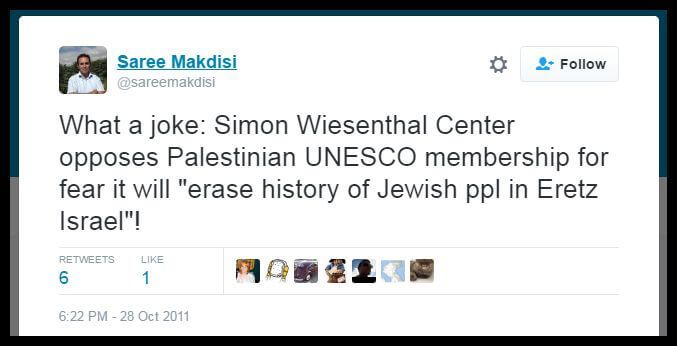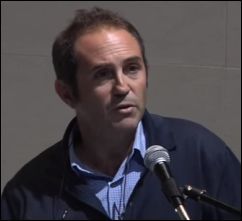The LA Times published an op-ed by Saree Makdisi, an anti-Israel professor at UCLA, in which he warns about activists on campuses being the victims of a campaign of intimidation. The “victims” he is referring to are not Jewish students targeted by BDS, but anti-Israel activists, himself included.
He complains that he was listed on Canary Mission, a website that exposes those who hate Israel and Jews, just because he has criticized Israel – “there being no distinction, apparently, between criticism of the policies of a foreign power and “hatred” of an entire ethnic group.”
Join the
There obviously is a distinction between the two, although Makdisi can’t see it.
While HonestReporting has no connection with Canary Mission and doesn’t necessarily endorse its methods, Makdisi’s singling out the Jewish state in many statements and writings cannot be classified as mere criticism. Many of his comments, unfortunately, are hatred by any definition of the word.
Makdisi, a professor of English and Comparative Literature, falsely accuses Israel of apartheid, maliciously claims that Israel deliberately kills Palestinian children, urges an academic boycott of Israel, and calls for Israel to be dismantled as the Jewish state – effectively for its destruction. We have previously called him out for questioning why anyone should recognize Israel’s right to exist, and accusing Israel of collective punishment in Gaza.
Interestingly, in 2011, Makdisi mocked the Simon Wiesenthal Center’s concern that Palestinian UNESCO membership would erase the history of the Jewish people in Israel. Today UNESCO approved a resolution put forward by the Palestinians that denies Jewish and Christian connections to Jerusalem and the Temple Mount, after the UN organization approved a similar one just a week ago.

Makdisi also refers to a poster campaign that accused students of supporting terrorism just “because they are members of student groups that dare to criticize Israeli policy.” Based on how he described and defended his own criticism of Israel, it’s hard to believe that those students have only engaged in legitimate criticism of Israel, and not something more closely resembling anti-Semitism. But that is besides the point. Makdisi writes:
These sorts of attacks on academic freedom, in which Israel’s defenders have played a disproportionate role, are all too common on campuses across the country, with devastating results. They have led to the intimidation of students, the silencing or firing of faculty and the cancellation of classes (as at UC Berkeley, where a class on Palestine and settler colonialism was reinstated only after faculty outrage).
In fact it is Jewish and pro-Israel (or even just neutral) students who are intimidated, delegitimized, harassed, excluded, discriminated against, held responsible for Israel’s actions, targeted with anti-Semitism, have had to hide from a violent anti-Israel mob and be extracted by the police, and been disrupted and shouted down and silenced to stop them speaking the truth to defend Israel against BDS lies.
As for the course at Berkeley Makdisi refers to, it distorts the history of the Jewish connection to Israel, denies Israel’s right to exist, and explores how Israel might be destroyed, no doubt making things feel even more uncomfortable and unsafe for Jewish and pro-Israel students.

But Makdisi suggests that, without resorting to “safe spaces” and “trigger warnings” for the poor, victimized anti-Israel activists on campuses:
What we urgently need, however, are ways to distinguish between feelings of discomfort caused by exposure to new or even shocking ideas, and actual vulnerability caused by a campaign that singles out individuals explicitly, intending to cause them harm.
Tell that to the Jewish students at the UC Irvine who had to barricade themselves to escape a BDS mob trying to violently disrupt an event.
Or perhaps he should tell that to Milan Chatterjee, a student president at UCLA – where Makdisi is a professor – who had been harassed and abused by BDS activists just for trying to remain neutral, to the point where he had to leave the university, stating:
The UCLA campus has become a hostile and unsafe environment for students, Jewish and non-Jewish, who choose not to support the BDS movement, let alone support the State of Israel.
What does Makdisi have to say to Chatterjee about that?
Makdisi is calling for universities to be made safer places for students to freely express their views – yet it is radical anti-Israel activists like himself who make Jewish and pro-Israel students feel intimidated and unsafe standing up for their views and for the Jewish state.
For resources on BDS, click
Image of Makdisi via YouTube/GVFJ;

